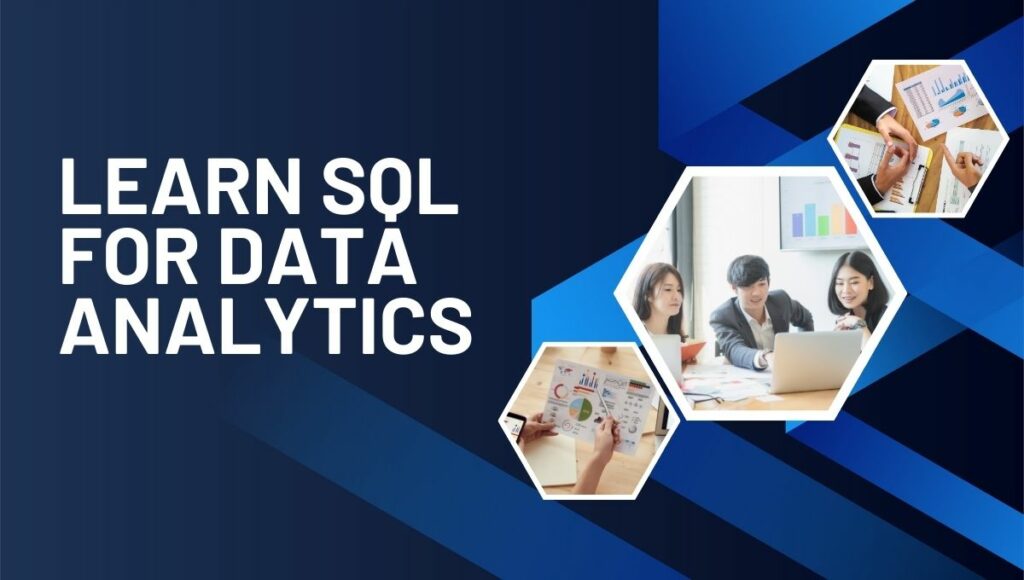If you’re eyeing a career in data analytics, one skill you absolutely can’t ignore is SQL. It’s the backbone of data handling, and learning it can seriously up your game. Think of SQL as the tool that helps you talk to databases, extract meaningful insights, and make sense of all those numbers floating around. Whether you’re a newbie wondering what is SQL or someone looking to refine their SQL skills, this guide has you covered.
Why Learning SQL is a Game-changer?
Data is everywhere. Companies rely on it to make informed decisions, improve customer experiences, and boost revenue. And guess what? SQL is the key that unlocks all that data. If you’re serious about data analytics, mastering SQL isn’t an option, it’s a must.
Before diving deep, here’s something to consider: Understanding SQL is great, but securing data is equally important. If you’re into data analytics, cybersecurity knowledge can be a huge plus. Check out the Cybersecurity Course by Imarticus Learning to strengthen your expertise beyond just analytics.
What is SQL?
Let’s start simple. Structured Query Language (SQL) is a programming language used to manage and manipulate databases. It’s like a bridge between raw data and meaningful insights. With SQL, you can:
- Retrieve specific data from huge datasets.
- Update, delete, or modify database entries.
- Perform calculations and generate reports.
- Join multiple datasets to extract deeper insights.
SQL is widely used across industries, from finance to healthcare, making it one of the most in-demand skills in the job market.
Why SQL for Data Analytics is So Important
Data analysts work with databases daily, and SQL helps them:
- Pull relevant data efficiently without sifting through endless spreadsheets.
- Optimise reports by creating dynamic queries that can be reused.
- Handle massive datasets with speed and precision.
- Ensure data accuracy by writing precise queries that reduce errors.
Without SQL, working with structured data would be a nightmare. Simple as that.
Essential SQL Skills for Data Analysts
Knowing SQL isn’t just about writing queries. You need a mix of technical and problem-solving skills to use SQL effectively. Here’s what you should focus on:
| SQL Skill | Why It Matters |
| SELECT Queries | Fetching specific data from massive tables. |
| JOINS & Subqueries | Combining multiple datasets for deeper analysis. |
| Aggregations | Summarising data (SUM, AVG, COUNT, etc.). |
| Indexing & Optimisation | Improving query performance on large datasets. |
| Data Cleaning | Identifying and removing inconsistent data. |
Master these, and you’ll be way ahead of the competition.
How to Learn SQL Without Feeling Overwhelmed
Let’s be real. Learning SQL from scratch can seem intimidating, but breaking it down into manageable steps makes it easier.
- Start with Basics: Get comfortable with SELECT, INSERT, UPDATE, DELETE.
- Understand Filtering: Learn WHERE, GROUP BY, and HAVING clauses.
- Work with Joins: Combine tables using INNER, LEFT, RIGHT, and FULL JOINS.
- Practice with Real Data: Use free datasets to write your own queries.
- Explore Advanced Functions: Window functions and stored procedures.
Learning SQL is all about practice. The more you use it, the better you get.
Real-World Applications of SQL for Data Analytics
1. Business Reporting
Companies use SQL to generate financial, sales, and customer reports in real-time.
2. Customer Segmentation
SQL helps analysts group customers based on buying behaviour, location, and preferences.
3. Website & App Analytics
Tracking user interactions and identifying trends using SQL queries.
4. Fraud Detection
Banks and financial institutions use SQL to detect suspicious transactions.
How SQL Boosts Your Career in Data Analytics
1. High Demand for SQL Skills
SQL is a non-negotiable skill for most data-related jobs, from business analysts to data scientists.
2. Better Job Prospects
Employers specifically look for SQL proficiency in job descriptions.
3. Cross-Industry Applications
SQL is used in e-commerce, healthcare, finance, and marketing—so your skills are always relevant.
4. Easy Integration with Other Tools
SQL works with Python, Excel, Tableau, and Power BI, making it an essential part of any data analyst’s toolkit.
Common SQL Mistakes Beginners Make (And How to Avoid Them)
- Not Using Indexing Properly: Leads to slow queries.
- Forgetting to Filter Data: Results in unnecessarily large datasets.
- Using SELECT Too Often: Fetch only what’s needed to improve efficiency.
- Ignoring Data Cleaning: Messy data = inaccurate analysis.
Learning SQL is great, but writing optimised and efficient queries is even better.
Final Thoughts: Start Learning SQL Today!
SQL isn’t just another tech skill; it’s a career game-changer. Whether you’re looking to break into data analytics or upskill for your current job, SQL will always be in demand. The best way to get started? Just dive in. Practice writing queries, explore databases, and build real projects.
And hey, don’t forget—cybersecurity is just as important as data analytics. If you want to expand your skillset, check out the Cybersecurity Course by Imarticus Learning and stay ahead of the game.
Frequently Asked Questions
How long does it take to learn SQL for Data Analytics?
You can learn the basics in a few weeks, but mastering SQL takes continuous practice and hands-on experience.
What are the best free resources to learn SQL?
Platforms like W3Schools, Mode Analytics, and Khan Academy offer great free SQL tutorials.
Do I need programming experience to learn SQL?
Nope! SQL is beginner-friendly and does not require prior coding knowledge.
Can SQL be used for Machine Learning?
Yes! SQL is often used for data preprocessing, which is a crucial step in machine learning.

